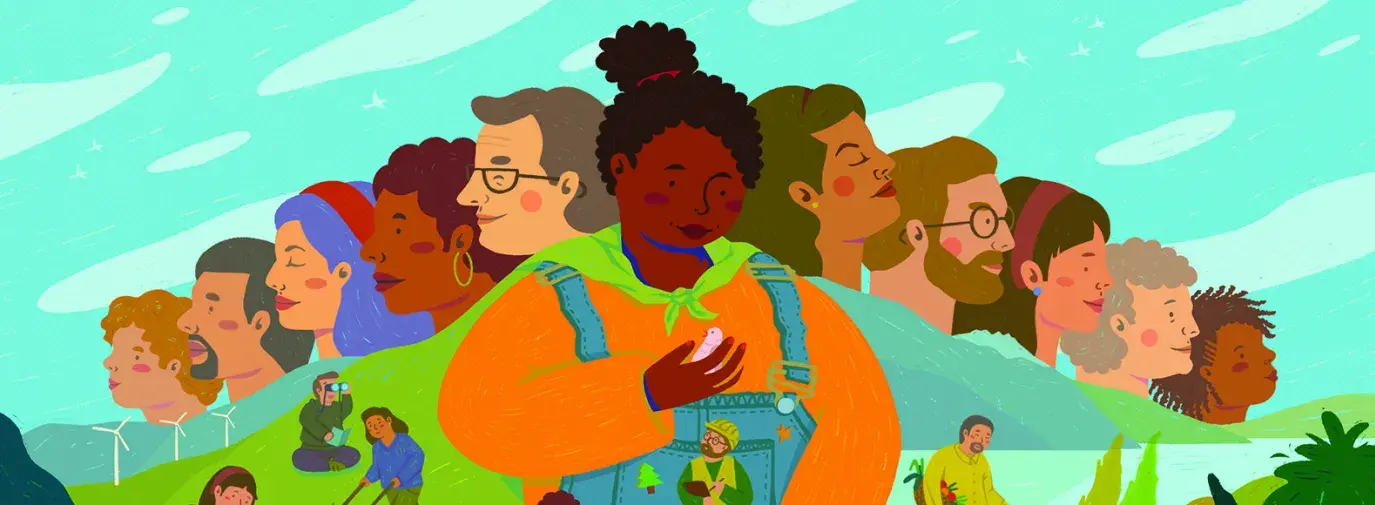
The intensity of the 2020 general election exposed the frustration so many Americans feel when our needs go unheard by government and corporations. It also showed the disillusionment we often feel with our political system, as many Americans wondered whether a new presidential administration would truly make a difference when it comes to long-battled systemic issues. Though we are often pitted against each other, many Americans are concerned about the same issues, and there is widespread agreement on the solutions. In 2019, roughly 70 percent of Americans said the country should focus more on wind energy and over 80 percent said the same for solar, according to a survey by the consulting company Gallup. Another Gallup poll taken in June 2020 showed that 65 percent of Americans supported protests against racial injustice and 61 percent of adults say that economic inequality ought to be a top priority for the government, according to the Pew Research Center.
Our 35 years of experience in fighting for our fragile planet and all its people tells us that no matter who is in political office, economic action is always crucial. Our work together is to get the entire economy behind powerful climate solutions, protecting workers, and working for real racial justice. By taking action together in our daily lives, as consumers, investors, and community members, we can make a huge difference in the world.
Major social change movements including Black Lives Matter, March for Our Lives, the Women’s March, and Me Too were all started by average Americans who were outraged by social injustices. The leaders profiled in our summer 2020 Green American magazine issue, Communities on the Frontline of the Climate Crisis, are people who saw environmental injustice in their communities and decided to take action to fight fossil fuel companies, food insecurity, government lagging on a Green New Deal, and voter suppression.
As more and more consumers raise concerns around climate impacts, worker abuses, and the use of toxic chemicals by corporations—and shift their spending to greener products and services—more companies are responding to that pressure by improving their social and environmental records. That progress has a ripple effect on the entire planet.
Taking Individual Action by Voting With Your Dollar
In an age of declining brand loyalty, large corporations are attuned to shifts in consumer preferences and it’s these shifts that are driving more non-GMO and organic foods, electric vehicles, non-toxic household and personal care products, and clothing with fewer toxic chemicals and more recycled fibers. This is why one of the biggest individual actions we can take for a truly just and sustainable world is targeting our purchases and investments to green enterprises. That often means not buying things we don’t really need, and when there is something we need, finding a way to get it that can support a local small business, green business, and/or entrepreneurs of color, instead of supporting a big box store or Amazon’s monopoly.
Growing consumer concern from these campaigns causes companies to fear that their brands will be damaged and will lead to a loss in sales. That’s why companies like Carter’s, Amazon, AT&T, and Verizon take action when consumers call on them to change their operations to address the climate crisis and their use of toxic chemicals. When you join your voices with others, you multiply your impact and though one small signature may not feel like a lot, it shows that a growing number of people are concerned.
You can also change where you bank and invest. Whether you have a simple checking or savings account at a bank or own stock, have a retirement fund, or other investment accounts, you can make sure that your money is working for the Earth, not against it. Community Development Financial Institutions (CDFIs) are places you can put your money that invests back into local communities unlike big commercial banks (like Chase, Bank of America, Wells Fargo, Citi, etc), which fund fossil fuel expansion and other dirty industries. However, there are signs that big banks are starting to hear investors and customers. This year, after much pressure from campaigns like Fossil Banks, No Thanks, a coalition action that Green America is a part of, JPMorgan Chase agreed to end new financing of coal and arctic drilling, and to phase out existing financing for coal mining by 2024. Read more about how to use your money to make change on page 8.
Taking Action in Your Community
Opening your door (or your laptop) and getting “out there” in your community can make a big difference. We all have a place we can make a difference. Start with organizations or places where you spend the most time or find the most joy—whether that’s a school group, church, block of your neighborhood, book club, office, riverfront, you name it. There will always be ways to make those spaces greener, more equitable, and more just. There are so many ways to make a difference—you could work on environmental issues like water conservation, clean energy use, recycling programs, or composting. You could also work on making your group more socially conscious, just, and equitable by switching banks, making a space or event more accessible, signing a petition together, attending a protest, or otherwise working on a social justice topic that is important to you. Community action does not have to be big to make a big difference, and we can find examples of it across the country. In Detroit, the faith-based environmental organization Hazon started growing “relief gardens” to help those struggling with food insecurity amid COVID-19. By bringing people fertilizers, vegetable seeds, and some basic how-to gardening knowledge, volunteers are putting being a good neighbor into practice. The Climate Victory Gardens sprouting nationwide are also inspiring examples of community climate action that is helping draw-down carbon from the atmosphere and increase access to fresh, quality produce.
Pressuring Corporations and Governments
The people who take part in Green America’s campaigns and those of our allies, make a huge difference, and time and time again, Green America’s economic strategy of amplifying consumer voices proves to be effective. Through our Cool It campaign, 100,000 consumers got Walmart to pledge to phase out HFCs by 2040. That’s progress, but not fast enough, so we’ll be keeping up the pressure on Walmart and urging other grocery stores that are failing on refrigerants to take action too—beginning with a campaign focused on Trader Joe’s launching this December. Additionally, we’re telling Carters to protect factory workers, consumers, and our planet from toxic textiles by adopting a stronger Manufacturing Restricted Substance List (MRSL), calling on the telecoms industry to transition to renewables and recruit more diverse talent into clean energy projects, and as always, continuing to demand that Amazon treat its workers and the planet better. You can learn more about our people-powered green economy campaigns by visiting Our Campaigns.
Advocating for green local and federal policies is also crucial. In January 2020, Richmond, Virginia’s 4th Circuit of Appeals unanimously denied a permit for the Atlantic Coast pipeline, a project that threatened to slash through natural spaces and harm Indigenous and Black communities in North Carolina and Virginia. Green America and hundreds of other environmental groups supported this effort by amplifying local demands through the Federal Energy Regulatory Commission (FERC) against Dominion Energy. In the 2020 general election, Florida passed an amendment to gradually raise the state’s minimum wage to $15. We are proud to have joined forces with the Fight for $15 coalition to help bring about this victory and look forward to securing more in 2021 with the help of our members, supporters, and allies.







